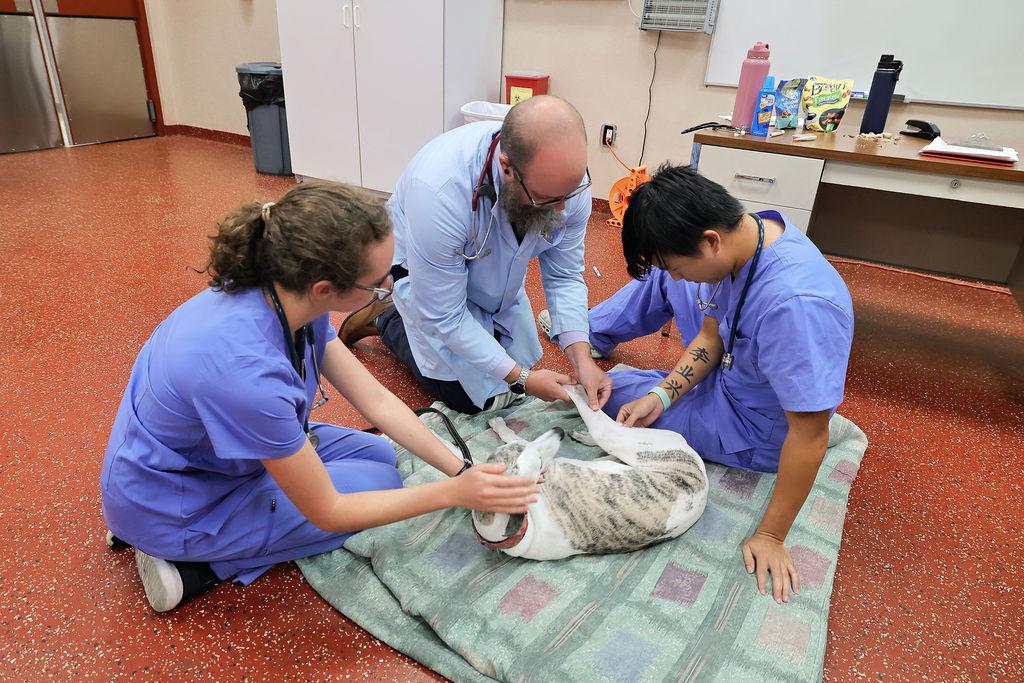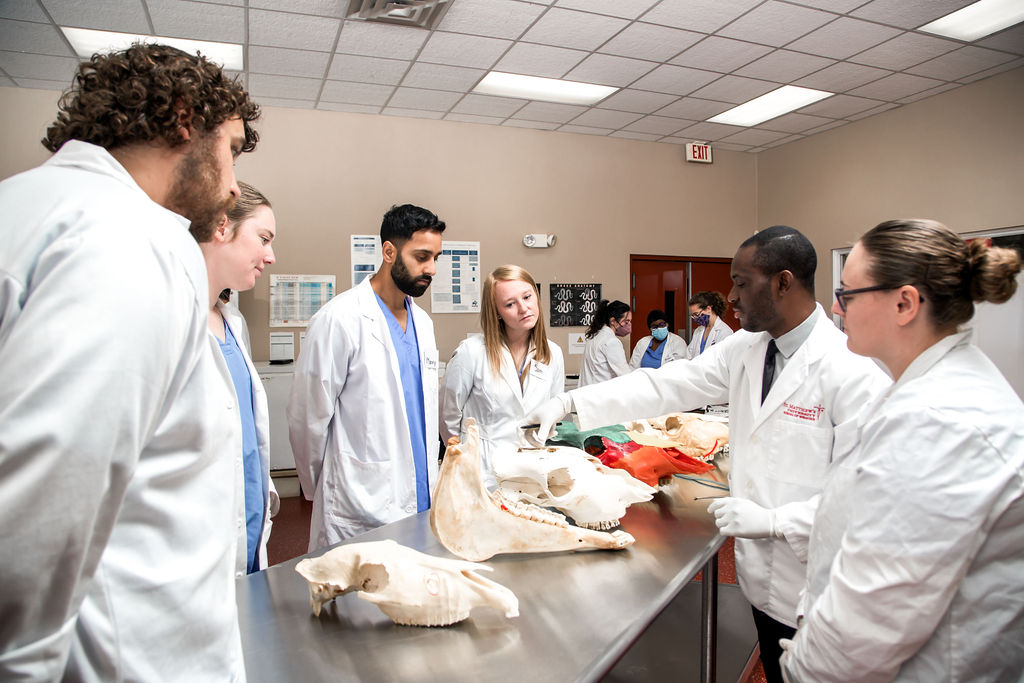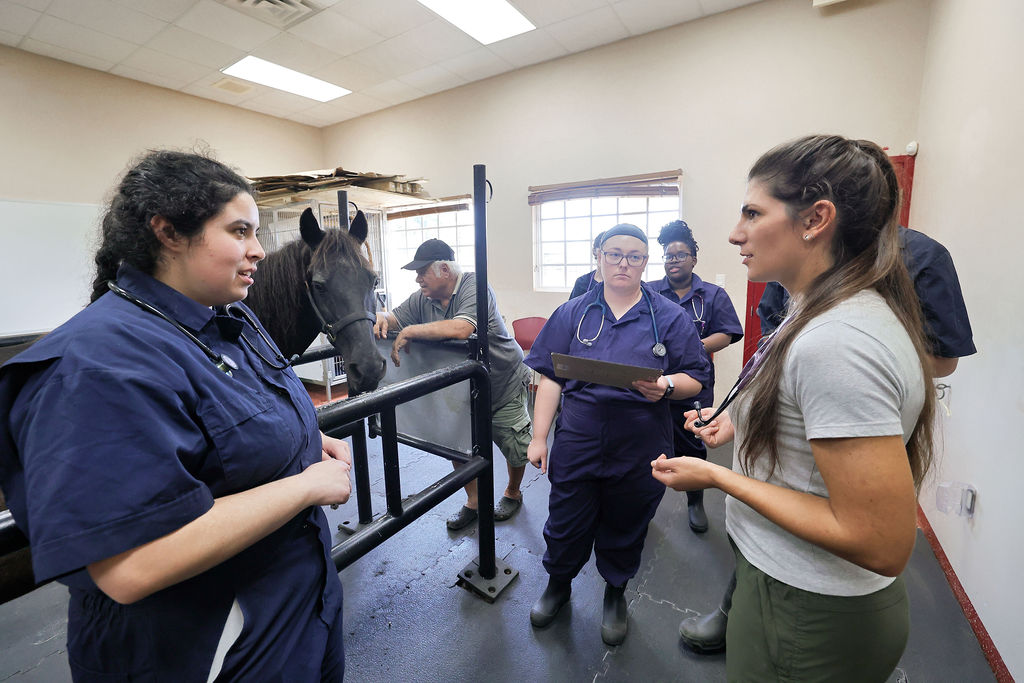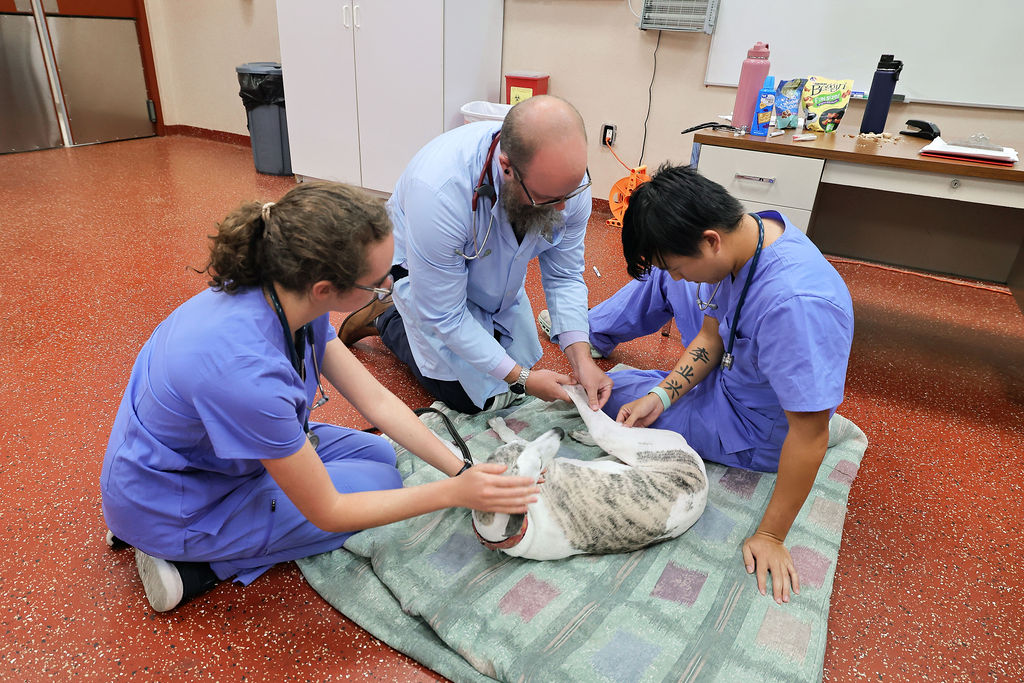
What are the Different Types of Veterinarians and What Do They Do?
Learn all about the various career options for aspiring veterinarians.
Veterinary medicine is a vast and exciting field, offering numerous career paths for those passionate about animal health and welfare. Whether you envision yourself treating beloved pets or contributing to global public health, veterinary careers are as diverse as the animals they serve.
This article will delve deeper into the different types of veterinarians and the unique roles they perform, giving you a clearer picture of where a Doctor of Veterinary Medicine (DVM) degree might lead and an answer to the question: what does a veterinarian do?
Different Types of Vets
Veterinary medicine isn’t a one-size-fits-all profession. While you probably already have a good sense of what a vet is, aspiring veterinarians can explore numerous specializations and distinctive career paths based on their interests and goals. Let’s explore some of the primary types of veterinarians and their responsibilities.
Companion-animal veterinarians
Companion-animal veterinarians are among the most recognized types of veterinarians, as they provide care for household pets like dogs, cats, birds and rabbits. Their services include vaccinations, wellness exams, diagnostic testing, and minor and major surgical procedures. These professionals play a vital role in fostering the human-animal bond, which has proven benefits for mental and emotional well-being.
In addition to medical treatment, companion-animal vets educate pet owners about proper nutrition, preventive care and behavioral issues. Their work not only supports the health of pets but also enhances the quality of life for their owners by helping them maintain a healthy, happy companion.
Veterinary specialists
Veterinary specialists focus on advanced fields such as surgery, dermatology, cardiology, oncology and neurology. These veterinarians often pursue extensive additional training, including internships and residencies, before achieving the board certification in their specialty.
This expertise allows them to address complex cases that general practitioners may not be equipped to handle. For example, a veterinary oncologist might develop a customized treatment plan for a pet with cancer, while a veterinary surgeon might perform intricate orthopedic procedures. Veterinary specialists frequently work in referral hospitals and collaborate closely with primary veterinarians to ensure comprehensive care.
Food-animal veterinarians
Food-animal veterinarians work primarily with livestock, such as cattle, pigs, sheep and goats. They are responsible for maintaining the health and welfare of these animals, which are integral to agricultural production. These veterinarians help ensure that food animals are free from diseases, which is essential for public health.
Their duties include vaccination, disease prevention and reproductive health management. For instance, the expertise of a food-animal veterinarian may be called upon to synchronize estrus cycles among cattle – a common practice to increase efficiency in livestock production. Food-animal veterinarians also educate farmers about best practices in animal care and biosecurity.
Food safety and inspection veterinarians
These veterinarians are essential for public health, as they oversee the safety and quality of animal-derived food products. They work with government agencies like the USDA or FDA, inspecting processing plants, ensuring compliance with health regulations and monitoring for potential foodborne illnesses.
Their work helps prevent contamination and ensures that food products are safe for human consumption. Food safety veterinarians also contribute to developing policies and protocols that uphold the integrity of the food supply chain.
Research veterinarians
Research veterinarians work at the intersection of science and animal health. They contribute to advancements in veterinary medicine, pharmaceuticals and public health by conducting studies on diseases, vaccines and treatments. Their work often overlaps with human medicine, particularly in areas like zoonotic diseases – illnesses that can transfer between animals and humans.
These veterinarians may be employed by universities, research institutions or for research projects backed by government agencies like the CDC. Their efforts not only benefit animals but also contribute to broader societal goals, such as controlling disease outbreaks and improving medical treatments.



Where Do Veterinarians Work?
Veterinarians can be found in a wide variety of workplaces, reflecting the diverse roles they play in society. Here’s an overview of where veterinarians practice their skills:
- Private clinics and hospitals: Most companion-animal veterinarians work in private clinics or animal hospitals. These facilities are equipped to provide preventive care, emergency treatments and surgeries. Many veterinary hospitals also house advanced diagnostic tools like X-rays and ultrasound machines, enabling comprehensive patient care.
- Farms and rural areas: Food-animal veterinarians frequently work on-site at farms or in rural communities, where they provide services like herd health management and emergency care. Their work is critical to sustaining the agricultural industry and ensuring food security.
- Zoos and aquariums: Zoo veterinarians specialize in the care of exotic and wild animals. They work to treat illnesses, manage breeding programs and educate the public about wildlife conservation. These professionals often collaborate with conservation organizations to protect endangered species.
- Government agencies: Veterinarians employed by agencies like the USDA or CDC focus on food safety, disease control and public health. They monitor zoonotic diseases and help prevent outbreaks that could affect both animals and humans.
- Research labs: Research veterinarians work in laboratories, conducting experiments that advance scientific knowledge in veterinary and human medicine. Their work may include studying diseases, developing vaccines or testing the safety of new pharmaceuticals.
Whatever your eventual place of work, the journey to becoming a vet starts with veterinary school.
What Is the Difference Between a Veterinary Hospital and a Veterinary Clinic?
While veterinary hospitals and clinics both provide essential animal care, they differ in scope and resources. Veterinary hospitals are larger facilities equipped to handle advanced medical cases, surgeries and emergencies. They often operate 24/7 and house specialists in various fields.
Veterinary clinics, on the other hand, focus on routine care like wellness exams, vaccinations and minor procedures. They are ideal for regular check-ups and preventive care. Both types of facilities are integral to the veterinary profession, offering complementary services to meet the needs of animals and their owners.
Become a Veterinarian at St. Matthew’s University
Veterinary medicine offers a world of opportunity for passionate individuals who want to make a difference in animal and human health. At St. Matthew’s University School of Veterinary Medicine (SMUSVM), aspiring vets receive the training and support needed to excel in this rewarding field. Now that you’ve learned some key facts about veterinarians, see what life is like as a DVM student at SMU:
If you’re ready to embark on this exciting journey, explore SMU’s DVM program and start your application today!
Please contact us if you have any questions or need any admissions support.
FAQs About Veterinary Careers
Yes, veterinarians are doctors. They hold a Doctor of Veterinary Medicine (DVM) degree and are licensed to diagnose, treat and perform surgery on animals.
Absolutely. Many veterinarians perform surgeries, ranging from routine procedures like spaying and neutering to complex orthopedic or emergency operations.
Becoming a wildlife veterinarian typically takes about seven to eight years of education: four years for an undergraduate degree and three to four years in veterinary school, depending on the institution and program you choose.
There are numerous types of veterinarians, including companion-animal vets, veterinary specialists, food-animal vets, food safety and inspection vets, and research vets. Each plays a unique role in animal care and public health.
Request Information